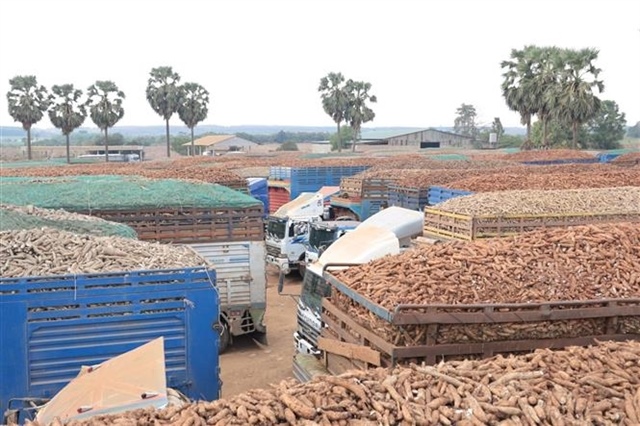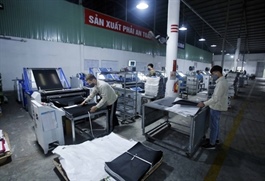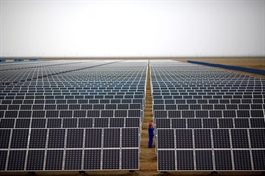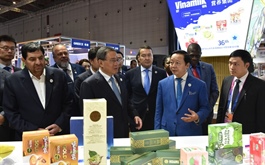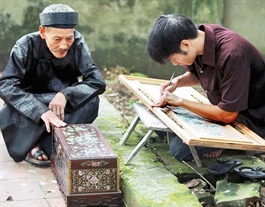Vietnam attractive to Dutch semiconductor companies: Dutch vice-minister
Vietnam attractive to Dutch semiconductor companies: Dutch vice-minister
Vietnam is appealing to semiconductor companies from the Netherlands as they see that a lot of customers are moving their operations to or investing in new opportunities in the Southeast Asian country, said Dutch Vice-Minister for Foreign Economic Relations Michiel Sweers.
|
Dutch Vice-Minister for Foreign Economic Relations Michiel Sweers gestures during an interview with Tuoi Tre News on November 3, 2023. Photo: |
“You do not have to do it all. Do the things you are good at and do them the best you can,” Sweers told Tuoi Tre News on the future of Vietnam’s semiconductor industry.
Vice-Minister Sweers joined the Netherlands' economic mission to Vietnam working from November 1 to 4.
The mission aimed to create connections, identify opportunities, and look to cooperate in high-tech as well as digitalization.
After Prime Minister of the Netherlands Mark Rutte concluded his two-day visit to Hanoi on November 2, Sweers traveled to Ho Chi Minh City the next day.
During his visit to the economic center of Vietnam, Sweers shared his optimism on the prospect for developing semiconductor production in Vietnam, and what the Southeast Asian country needs to do to achieve its ambition.
There were about 30 Dutch high-tech enterprises accompanying Prime Minister Mark Rutte during his visit to Vietnam. Can you share their expectations for the trip?
Well, there were a variety of companies. So the theme was high tech with a focus on semiconductors. And what you see is that we have well-established companies that are already producing across the globe with an enormous number of employees.
But we also have startups on board, specifically small companies, young people. They have a specific technique that they really think can help the semiconductor industry and are looking for investors and new clients to build up their production.
We have seen companies [specializing] in manufacturing equipment, but also, for example, financial companies on board who are looking for projects and project financing in the semiconductor industry. So there is a whole range of companies that went with us on this trade mission.
What potential do Dutch enterprises see in Vietnam, especially in the semiconductor industry, in the current global situation?
There are massive opportunities here. So the world is changing. You see on the one hand that the demand for semiconductors is increasing enormously, and its supply is lagging behind on the other hand.
And we have seen what the results of that were a couple of years ago during COVID-19 and after that, there were enormous shortages in the supply of semiconductors across the globe. Companies are ramping up their production, including those in the Netherlands. What you also see is that they try to diversify their portfolio.
So companies have experienced that they are vulnerable if all the production comes from only one or two places. They are looking at other countries to invest in. And Dutch companies are particularly strong.
In the Netherlands, we have the whole value chain of semiconductors, but we are particularly strong in manufacturing equipment. And what you see is that the manufacturers in the Netherlands are looking at where the demand is growing, where the production is, where their customers are. And they see that a lot of customers are moving their operations to or investing in new opportunities here in Vietnam.
They tend to follow and look for investment opportunities in Southeast Asia. So we have been to Malaysia, but we are now in Vietnam. And Vietnam has a lot to offer. There is enormous economic growth here. So whatever happens, it happens fast and it tends to grow.
An enormous number of people here are willing to work in these industries. They are generally well trained. And there is a very stable government.
So there are good opportunities for these companies to set up business in Vietnam. That is why we came here, to see what is happening in Vietnam, to lay contacts between Dutch companies and Vietnamese companies, between governments, and see where the opportunities are, to get to know each other. And I am quite convinced that this will have success.
So what expertise can the Netherlands offer that you think will help Vietnam better integrate into the global supply chain of semiconductors?
Well, it is a big industry and there are many places where you can be as a country.
You do not need to have it all in your country. And I think where Vietnam is strong is more in the back end of production. Companies like Intel here do activities in the back of production. And that is perfect. I mean, you do not have to do it all. Do the things you are good at and do them the best you can.
And so that is not an issue. I do understand that for a longer term, the ambition is to step up in the value chain and to also get more into the front end of chip production or chip design. I get that and I think it requires a stable situation as well as investments in science and research and development.
And what we see in the Netherlands is what you should do is you have very close cooperation within the semiconductor ecosystem. So that is not a single company that has a presence and produces chips. It is a whole network of companies that work closely together to upgrade the level and the innovation that you need to be at the front end.
You also need close cooperation between universities, research institutes, and these companies to really stay ahead of the rest and to be very close to what is possible. So the distance between fundamental science, applied science, and actually producing something needs to be as short as possible.
To get there takes time. That is not something you can create overnight, but it is something that can grow over time.
So what should the Vietnamese business sector and the government do to gain a better opportunity to collaborate with Dutch companies in the high-tech industry?
We felt very welcome here. A lot of companies opened their doors and were open to discussions and talks. I saw that a lot of people speak English pretty well, so it was quite easy to make contact, and a lot of people were well trained.
Vietnamese companies do a lot of good things to get in contact. So I think that also explains why so many companies are entering this country. Yes, Vietnam has its challenges, and we should be honest about that, so it is not all perfect here.
The strengths Vietnam has to offer are the size of the country, the location where it is, the number of people, the attitude of the people, a very entrepreneurial spirit, the knowledge of English, the economic growth and all the opportunities it offers, as well as the number of companies that are here and that are willing to cooperate.
We also had very constructive talks with the government. I think if you look at how the visit of our prime minister went yesterday [November 2] and the interaction we had with the government in Hanoi, I think that was very constructive and very fruitful, so I am very positive about that as well.
The issue is if you talk to companies here and you ask what our main concerns are, they are bureaucracy, red tape, and the uncertainty about the impact of legislation. And I would also say the quality of the infrastructure.
Investing in Vietnam also comes with risks, but I think that if you look at the business atmosphere here, to me it feels very vibrant. I felt a lot of energy, a lot of openness, a welcoming attitude, a willingness to learn, a willingness to cooperate, so I think there are many things going well from that perspective.






